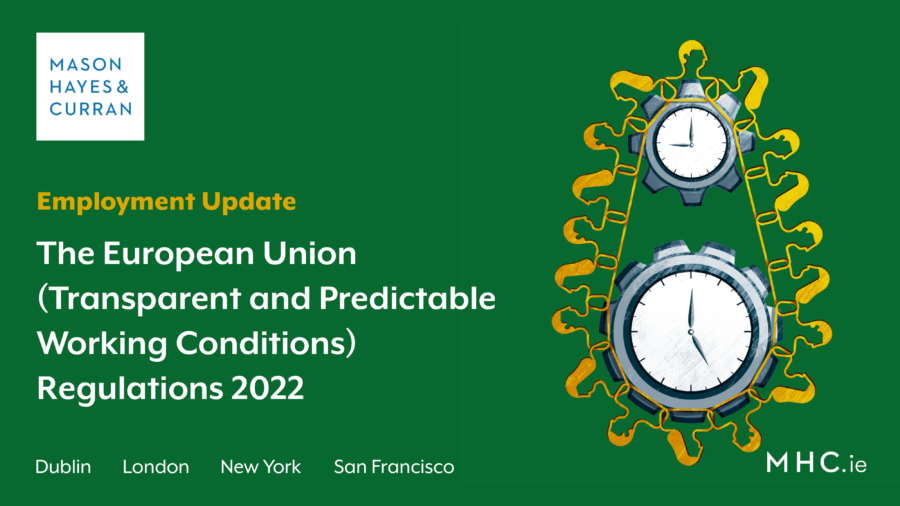
The European Union (Transparent and Predictable Working Conditions) Regulations 2022 were quietly passed into Irish law in December 2022. The Regulations place new obligations and restrictions on employers including additional written terms that must be provided to employees on commencement of employment and a general prohibition on exclusivity of service restrictions. The Regulations also provide employees with a right to request more predictable and secure working conditions. Our Employment Law & Benefits team reviews the implications for employers.
The EU Directive 2019/1152 on Transparent and Predictable Working Conditions in the European Union was transposed into Irish law in December 2022. This was transposed by the passing of the European Union (Transparent and Predictable Working Conditions) Regulations 2022 (Regulations).
Employers need to familiarise themselves with the changes introduced by the Regulations, which include:
- Additional written terms of employment that employers must give employees on commencement of employment and a new timeframe for providing them
- A new maximum duration of probationary periods for both private and public sector employees
- A general prohibition on exclusivity of service clauses, and
- The introduction of an employee’s right to request more predictable and secure working conditions
Written terms of employment
The Regulations updated the written terms that must be provided to employees on commencement of employment. Certain additional terms are required to be provided within 5 days of commencement of employment, and other additional terms are now required to be provided within one month, which previously had to be provided within two months:
- The additional terms that now need to be provided within five days include terms relating to remuneration, place of work, job title/specification, commencement date, hours of work and details of any probationary period
- The additional terms that now need to be provided within one month include terms relating to training entitlement, the identity of social security institutions and, where applicable, information relating to unpredictable work patterns
While previously employers had one month to notify employees of any changes to the written terms, any changes must now be notified no later than the day on which the change takes effect.
There are also additional written terms to be provided to employees who are posted workers.
Separately, the Regulations provide that where an employer is required to provide training, by law or collective agreement, the training must:
- Be provided free of cost
- Count as working time, and
- Take place during working hours, where possible.
Probationary periods
The Regulations provide for a maximum duration of probationary periods:
- For private sector employees, probationary periods cannot exceed 6 months. On an exceptional basis, and where it would be in the interest of the employee, a longer probationary period of up to 12 months can be imposed.
- For public sector employees, probationary periods cannot exceed 12 months.
- Where an employee is absent on protected leave during probation, the probationary period is extended for the duration of the period of absence.
There are additional restrictions in relation to probationary periods in fixed term contracts.
Where a private sector employee is subject to a probationary period which is longer than 6 months, but had completed at least 6 months of their probation on 16 December 2022, the probationary period is deemed to have expired on 1 February 2023.
Prohibition on exclusivity of services clauses
The Regulations prohibit an employer from restricting employees taking up employment with another employer outside of their normal work schedule, except where the restriction is proportionate and based on objective grounds. Health and safety, protection of business confidentiality and avoidance of conflicts of interest are some of the objective grounds listed in the Regulations.
Transition to more predictable and secure working conditions
Where an employee has at least 6 months’ continuous service and has completed their probationary period, they may submit a request for a form of employment with more predictable and secure working conditions. The employee can make this request once in any 12 month period.
Conclusion
This low key introduction of the Regulations may take even the most vigilant of employers by surprise. It is therefore crucial that employers review their standard contracts of employment to ensure compliance with the new requirements.
For more information or assistance, contact a member of our Employment Law and Benefits team.
The content of this article is provided for information purposes only and does not constitute legal or other advice.
Share this:






